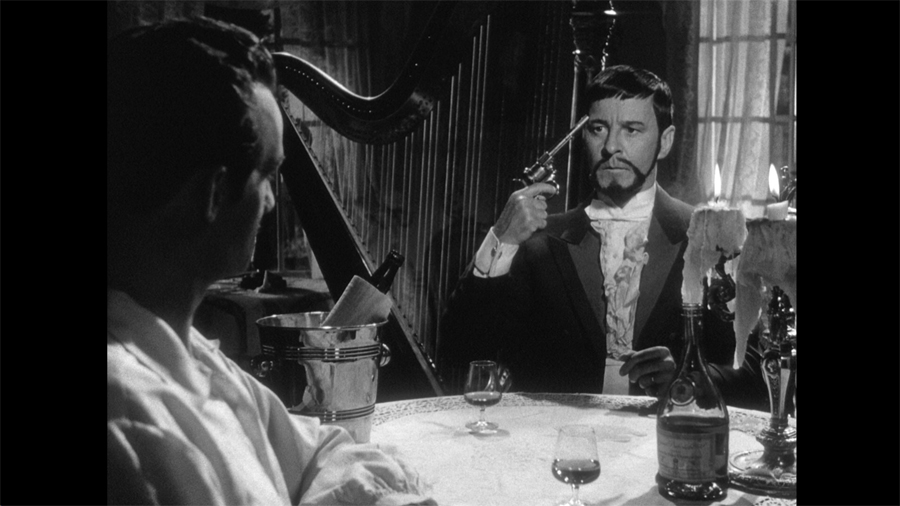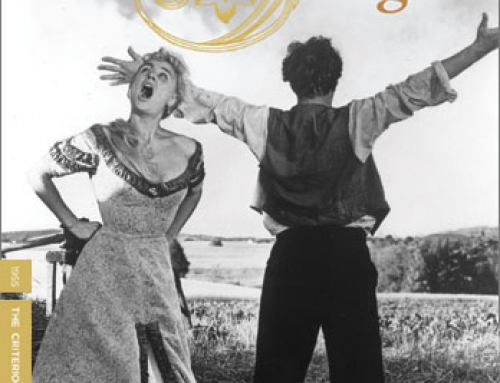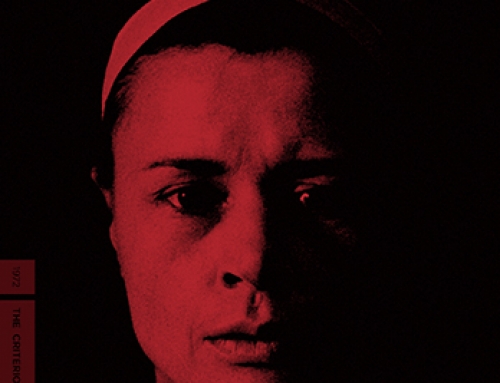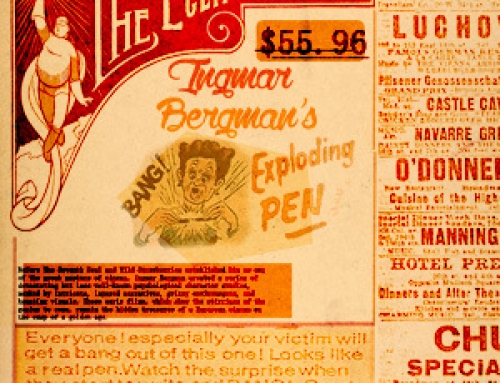Review of The Criterion Collection Blu-ray edition. Spine: #237 Release Date: May 3, 2011 Screen captures below are taken from The Criterion Collection Blu-ray disc, but resolution has been reduced from 1920x1080 to 900x506 and slightly compressed. You may click on them to view the 900x506 image.
A few years ago, two of my teenage nieces were visiting my wife and me for the summer. When my birthday came around, they thought I was “super lame” when I got giddy after my wife gave me an Ingmar Bergman boxset instead of some skinny jeans from Hollister or something. I’m still giddy about this box set and watch these movies one or two times each year. The set includes Bergman’s Smiles of a Summer Night, The Seventh Seal, Winter Strawberries, and The Virgin Spring. Each film is also available individually from The Criterion Collection.
When I decided to start writing a few thoughts on Bergman’s movies, I was tempted to begin with the three films he made in the early 1960s, often called the Faith Trilogy or the Silence of God trilogy. They were my introduction to Bergman, after all, and Winter Light, the second film, is possibly my favorite movie ever. But for reasons to come, Smiles of a Summer Night (1955) seemed a better place to start.
First, Smiles of a Summer Night was the film that brought international success to Bergman. Though he was still a young filmmaker, beginning with Torment in 1944, over the course of a decade he’d already directed 15 feature films. In fact, that he had been so prolific but failed to gain a large audience had taxed Bergman, and it’s hard to get into a discussion about this film without also discussing the depression Bergman was apparently suffering when he wrote it.
Brooding, melancholic, depressing . . . not at all! At the 1956 Cannes Film Festival, Smiles of a Summer Night won the award for Best Poetic Humor, the perfect award for this picture. So this is the second reason I want to start with this film: despite his reputation, Bergman wasn’t all seriousness and sadness, and it pays to remember that. The Criterion cover shows a couple reveling the glorious new dawn.

This movie never fails to charm me, and I can confidently say it never will. Set at the turn of the century (19th to 20th), it begins by introducing us to Fredrik Egerman, played by the great — and I’ll keep bringing him up as I go through more of Berman’s films — Gunnar Björnstrand (one thing I like about Bergman is his use of the same actors over and over again; they are great actors, and it’s fantastic to see them bring out different roles as they age).
Fredrik Egerman is a middle-aged lawyer and has lost his first wife. That’s in the past (kind of). He’s now married to nineteen-year-old Anne (Ulla Jacobsson). They’ve been married for two years when this movie begins, and they’ve never consummated the relationship. Anne is reticent and Fredrik is sensitive: he’d like it to happen — so noble — on her time, when she’s ready. Here they are, early in the film, taking a nap together. They look like two dead people sharing a casket.
But as ignorant as Anne is about sex, she is curious and, perhaps, willing. There’s a moment during the nap when Fredrik looks like he may be making his move, but then he slips up, obviously mostly asleep, and says the name “Desiree.”
Desiree Armfeldt (Eva Dahlbeck) is an old “friend” of Fredrik’s, and it just so happens that Fredrik and Anne are going to see a play that night in which she’s the star. She’s an actress – that says it all (or so the folks say) – and Anne, completely jealous now, cannot stomach the performance and goes home to go to bed. Fredrik, unaware of his slip-up during the nap and therefore ignorant of his wife’s real reason for leaving, decides to go out on a walk with Desiree, ends up soaking wet after falling in a puddle, and, because Desiree’s place is close, has to warm up by putting on the night-clothes of Desiree’s current lover, the arrogant, militaristic Count Carl-Magnus Malcolm (Jarl Kulle). Naturally, the Count shows up during this awkward moment.
Well, the Count’s (also young) wife, Charlotte (Margit Carlqvist), knows full-well about her husband’s affair with Desiree, and, despite the comfortable lifestyle he provides her, she doesn’t approve. Desiree doesn’t seem to like the arrangement either. Fredrik has always been her favorite (and may even be the father of her son, Fredrik).
All of this is set up in just the first bit of the film. The fun really begins when Charlotte and Desiree form an unlikely but believable alliance, Charlotte to secure the affections of her own husband, the Count, and Desiree to secure the affections of Anne’s husband, Fredrik. But don’t worry. They aren’t so cruel as to leave Anne out: she can have Fredrik’s grown son, Henrik (Björn Bjelfvenstam). Henrik is chastely studying to be a minister even amidst the distraction of his father’s young wife and her curvy maid Petra (Hariet Andersson, one of my favorites). Oh, but Henrick has some urges:
Off the families and lovers go to spend some time together in the countryside at the estate of Desiree’s mother, where Charlotte and Desiree hope their plan will come to fruition. Along for the ride and unbridled are Petra and the lusty groomsman Frid (Åke Fridell).
Marvelously acted and full of wit, this is a very fun romantic comedy that manages to be exceedingly light and a touch grave:
Okay, it’s not actually that grave at all. Though Bergman is primarily remembered for his darker films, he should also be remembered for making one of the greatest comedies of all time — before he went on to make some of the greatest films of all time. Thankfully, besides launching his career, this movie gave Bergman that independence.
This edition is not particularly loaded, containing only a couple of features.
First we get a 4-minute introduction by Ingmar Bergman from 2003. He calls it a turning point “in every way.” He talks about how surprised he was when the film was so well received, finding out that it played at Cannes one day while reading a newspaper on the toilet. Due to its success, he received a great deal more freedom to pursue the projects he was personally interested in. Also, I was interested to hear that at the time Bergman was very poor and had to borrow money from Bibi Andersson, whom he was dating a the time, to buy a plane ticket to Cannes to follow up on the film.
Second — and last, other than the trailer — there is a 17-minute discussion between Peter Cowie and writer Jörn Donner.
Along with the disc, we get a nice booklet featuring an essay by John Simon about Bergman’s career building up to this film. Also in the booklet is Pauline Kael’s review of the film.
So, while the supplements are not as great as we might be used to, spoiled as we are, but this is a tremendous film and a great presentation.













I remember my shock and delight at “Smiles.” Oh God, in 1956 I was a new-bride-cum-college-graduate and ‘foreign’ films that were frank and sophisticated just knocked me out. Remember that in 1956 American movies, people had to put on their bathrobes and slippers to get out of bed even if the house was burning down. (Compare that with Lena Dunham, why dontcha, if you want to see how far we’ve come. Or not.) Actually, “Smiles” harked back to the much wittier comedies of Nick and Nora Charles, but that was before I started paying attention and the great gray curtain of the Hayes office had fallen meanwhile.
Change that to the Breen Office – much more officious and puritanical.
I love this film too. Thanks for reminding me it’s time to pull out the old Criterion and watch it again.
I’ve not seen this, hadn’t even heard of it, and had no idea that Bergman could be fun. I’ll take a look for it, as it sounds utterly charming.
Thank you, Trevor, for suggesting this! We were surprised by it and enjoyed it. It put me in mind of Woody Allen’s A Midsummer Night’s Sex Comedy. Despite being a farce, however, it had traces of Bergman’s later ideas. But it is hard to imagine how he made the leap from comedy to tragedy. Do you know anything about that transition?
You’ve made me feel much better about starting with this Bergman, then, Max!
Betsy, if you were thinking of A Midsummer Night’s Sex Comedy then you’re right on track. Allen was more than thinking of Smiles of a Summer Night when he made that.
I’m not a Bergman expert, sadly, but I’ll throw in my two-cents’ to respond to your question. There are a few things to consider, I think, that suggest it wasn’t actually a transition from comedy to tragedy.
Bergman had a past directing in the theater (and was, in fact, directing in the theater when he made this film). You can see that influence in this movie. I don’t know much about his work in the theater, but I imagine he had a round career, working with both comedy and tragedy. As for his films, when this came out he had already worked plenty with the themes of alienation, frustration, despair, etc. And not all of them had a sad ending.
It’s true that Bergman is best known for his bleak tragedies, particularly his films of the late 1950s and the 1960s and 1970s. I love these films and will be posting on them in due course (I’ve already got several more posts written up and ready when their time comes). But not even all of his films during this period were tragedies. Wild Strawberries, though it kept me up the night I first watched it, is beautiful and somewhat positive, if not actually comic. The Magician (1958) is certainly comic at times. And, another film that kept me up the first time I watched it, Fanny and Alexander is filled with the joy of life — of course, it’s also filled with tragedy and despair.
I really can’t think of anything else Bergman did that matched this level of comedy and farce, but it’s at one of a spectrum that, while heavily balanced on the tragic, does not neglect the comic.
Do you have plans to watch any more of Bergman’s movies, Betsy?
Trevor, your quick framework makes approaching Bergman much more appealing. Given your helpful introduction, I am hoping you will be doing Wild Strawberries and The Magician next. It’s funny, perhaps Bergman is a little like Alice Munro. I had often tried to read the late Munro and found it very difficult going. But now that we have read the very first of her work, she is much more accessible. It’s nice to know a person from their youth.
I am hoping that will happen with Bergman as well. The mature Bergman is challenging, frightening, even. I do remember Fanny and Alexander with great pleasure and look forward to watching it again – when you get to it. I think maybe Bergman is a director one needs to approach with some fellow travelers, He’s not a good choice for solo flying. In my college days, I just didn’t have the language for him. Would have been better if it had been a course, but he was just hot off the press, then. So, yes – I am looking forward to this (guided) Bergman series that you are doing. It’s an opportunity! I hope Madwoman and Max and Andrea and a few more will join in.